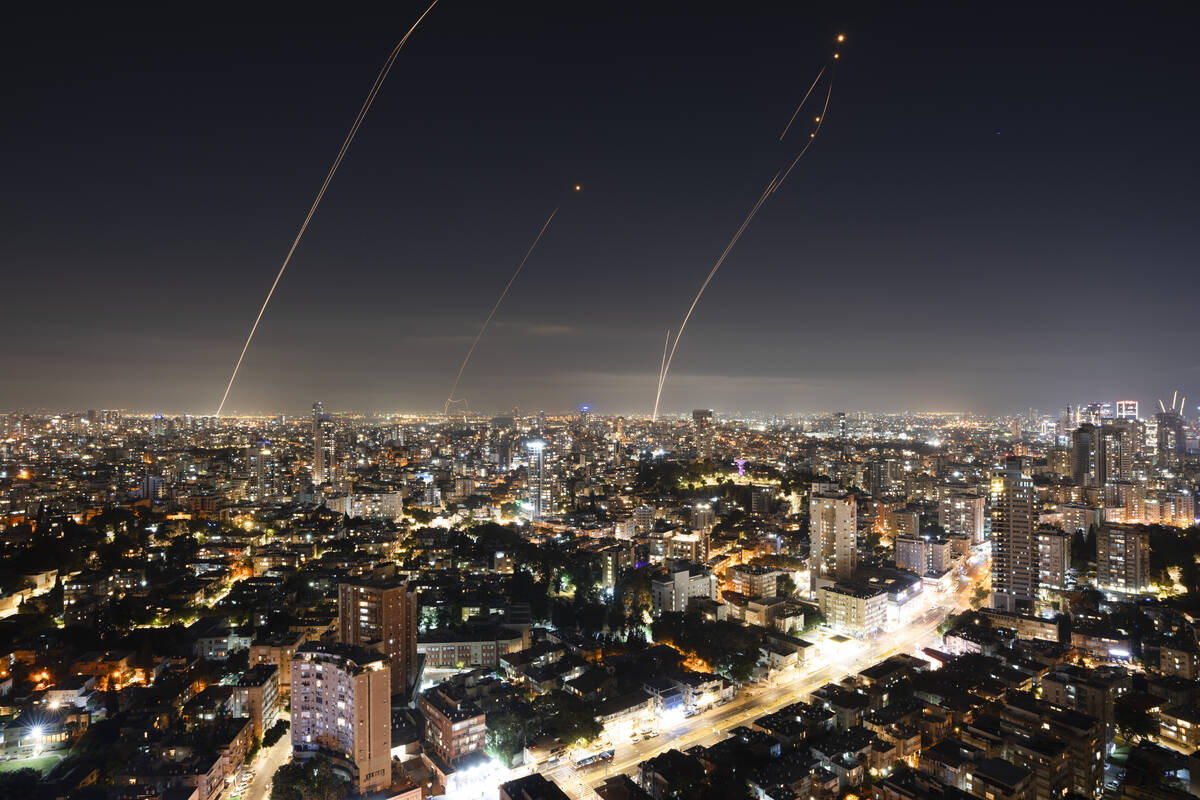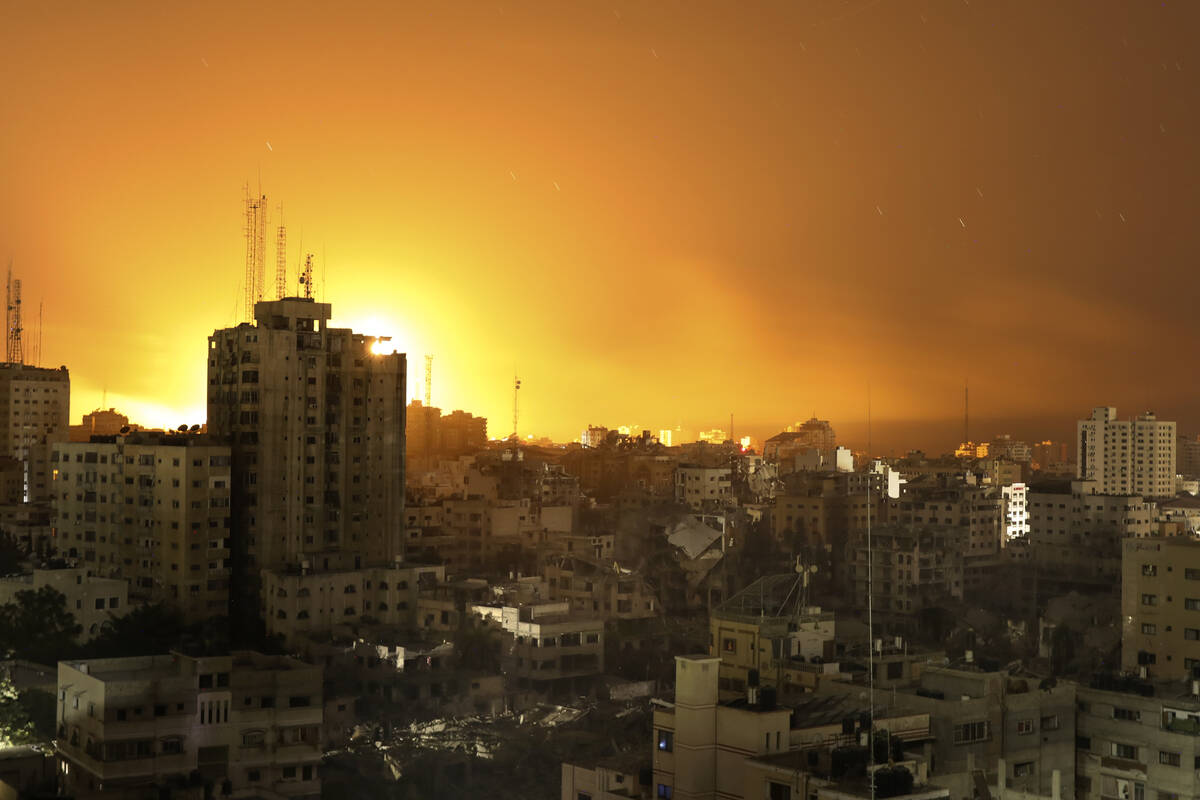Israel severs north Gaza from south ahead of expected push into city
DEIR AL-BALAH, Gaza Strip — Israeli forces severed northern Gaza from the rest of the besieged territory and pounded it with intense airstrikes overnight into Monday, setting the stage for an expected push into the dense confines of Gaza City and an even bloodier phase of the month-old war.
Troops are expected to enter Gaza City soon, Israeli media reported, and Hamas terrorists who have had years to prepare are likely to fight street by street, launching ambushes from a vast network of tunnels.
The Israeli military said late Sunday that it had cut off northern Gaza from the south, calling it a “significant stage” in the war. On Monday, it said that aircraft struck 450 targets overnight and ground troops took over a Hamas compound. In the overnight strikes in Gaza, the Israeli military said it had killed a senior Hamas terrorist, identified as Jamal Mussa, who had allegedly carried out a shooting attack against Israeli soldiers in Gaza in 1993.
A one-way corridor for residents to flee south remains available, according to the military, for the hundreds of thousands of Palestinians who remain in Gaza City and other parts of the north.
Casualties likely will rise on both sides in the war, which started Oct. 7 when Hamas raided southern Israel and killed more than 1,400 people, mostly civilians, and took some 240 people hostage. About 9,700 Palestinians have been killed in Israeli counterattacks, according to Gaza’s Health Ministry, an arm of Hamas that does not separate civilian and terrorist totals. Both tolls are unprecedented in the decades-old conflict.
Some 1.5 million Palestinians, or around 70% of Gaza’s population, have fled their homes since the war began. Food, medicine, fuel and water are running low, and U.N.-run schools-turned-shelters are beyond capacity, with many sleeping on the streets outside. Hamas, meanwhile, continues to fire rockets into Israel from points throughout Gaza.
Mobile phone and internet service went down overnight, the third territory-wide outage since the start of the war, but was gradually restored on Monday, according to the Palestinian telecom company Paltel and internet access advocacy group NetBlocks.org. Aid workers say the outages make it even harder for civilians to seek safety or even call ambulances.
Israel has so far rejected calls from the Biden administration for a pause in fighting to allow the delivery of humanitarian aid. Israel has also dismissed calls for a broader cease-fire from Arab countries — including Jordan and Egypt, which made peace with it decades ago. Israeli Prime Minister Benjamin Netanyahu said all hostages must be released as a condition of a cease-fire. Hamas has demanded the release of thousands of Palestinians held in Israeli prisons in exchange for the hostages, a demand Israel has rejected.
The war has also stoked wider tensions, with Israel and Lebanon’s Hezbollah terrorist group trading fire along the border. In another sign of growing unrest, a Palestinian man stabbed and wounded two members of Israel’s paramilitary Border Police in east Jerusalem before being shot dead, according to police and an Associated Press reporter at the scene.
Israel captured east Jerusalem, along with Gaza and the West Bank, in the 1967 Mideast war. The Palestinians want all three territories for a future state. Israel annexed east Jerusalem in a move not recognized by most of the international community and considers the entire city its capital.
In northern Gaza, a Jordanian military cargo plane air-dropped medical aid to a field hospital, King Abdullah II said early Monday. It appeared to be the first such airdrop of the war, raising the possibility of another avenue for aid delivery besides Egypt’s Rafah crossing, which has so far been the only entry point.
Over 450 trucks carrying aid have been allowed to enter Gaza from Egypt since Oct. 21, but humanitarian workers say it’s insufficient to meet mounting needs in the territory, which is home to some 2.3 million Palestinians.
Northern Gaza is facing a severe water shortage, as there is no fuel to pump from municipal wells and Israel shut off the region’s main line. Israel has restored two water pipelines in central and southern Gaza, the U.N. said. Israel has demanded the release of all hostages as a condition for easing its seige around Gaza.
Some 800,000 people have heeded Israeli military orders to flee to southern Gaza. Some 2,000 people, many carrying only what they could hold in their arms, walked down Gaza’s main north-south highway on Sunday.
On Monday, Palestinians held a mass funeral for 66 people outside a hospital in the central town of Deir al-Balah. The bodies were wrapped in white sheets on the ground outside the hospital morgue. Israel blames civilian casualties on Hamas, which operates in residential neighborhoods.
Israel says 30 troops have been killed since the ground offensive began over a week ago. Hamas rocket fire into Israel has significantly disrupted daily life even as most are intercepted by the Iron Dome defense system or fall in open areas. Tens of thousands of Israelis have evacuated from communities near the volatile borders with Gaza and Lebanon.
Magdy reported from Cairo. Associated Press journalists Najib Jobain in Khan Younis, Amy Teibel and Sam McNeil in Jerusalem, and Kareem Chehayeb in Beirut contributed to this report.


















